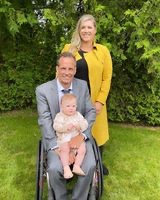The Doctor (Luke Fildes)
Some time ago, my sister-in-law found a framed art print that was in Dad’s den in the home where I grew up; the print was inspired by the 1891 painting “The Doctor” by Luke Fildes that depicts a Victorian doctor observing the critical stage in a child's illness while the parents gaze on helplessly from the periphery.
It has been used to portray the values of the ideal physician and the inadequacies of the medical profession. I had a particular affinity for that painting as during my first two years, the den had been my bedroom; soundproof and dark. My parents learned in short order that I did much better with sleep when there were no outside interferences. I came to learn that children with CP are challenged by overstimulation and sleep is challenged if mechanisms are not put in place to ensure quality rest. Today, I wear a sleep mask.
According to historical accounts, the most important influence behind the painting was the death, on Christmas morning, 1877 of Fildes' first child, one-year-old son, Philip, who succumbed to typhoid fever. The child in the sick bed has long curly hair so it’s difficult to know the baby’s gender. In my little child’s mind, as I grew, I identified with that baby.
Like the child in the sickbed, I had a doctor at my bedside during those early years; my father, one of the physicians practicing in the small village of Bath, New Brunswick researched what he thought might be wrong with me and my legs months before the official diagnosis by both a paediatrician and orthopaedic surgeon in Fredericton, NB. All three physicians provided compassionate care decades before medicine became a ‘numbers’ game.
In ‘The Doctor’, the physician is treating the child, his patient, as a person, being a compassionate caregiver with empathy for the child’s suffering. That’s how my father treated his patients long before Medicare -- going out on house calls late into the night, attending at scenes of car accidents; one in particular, years ago, involving fatalities which also injured my eldest brother.
I recall many evenings, while my brothers and sisters and I were watching television, Dad was on the phone in another room, speaking with a patient about various concerns. Most evenings were dotted with such phone calls. Today’s doctors aren’t likely to be investing much of their ‘down time’ to fielding after hours calls from anxious patients. Would be dollar saving if they did.
Our province needs more qualified physicians willing to practice in rural settings to fill in the gaps left by professionals leaving for ‘greener pastures’ – better hours and better pay, and willing to add their name to a roster of physicians who will make house calls.
For years, I have been of the view that doctors making house calls is the more efficient way to DO good medicine. A province-wide scheme of visiting doctors would save millions in health care dollars, with home-based primary care focusing first on a vulnerable and disenfranchised population, often older adults with multiple chronic conditions who also experience problems with basic activities of daily living “They are what payers refer to as 'high need, high cost.'” Their greater needs cost more, so staying ahead of the demand at home will avoid the more costly hospital admission in terms of hands-on care and bed space.
In attending at the home of an elderly or older patient specifically, the care provider is able to assess the environment if only in a limited way. A walk-about in the common areas would allow the visiting doctor to note any areas that need attention – like bathrooms and safety – are there grab bars in place? As we age, balance becomes an issue and bathroom falls are reduced with safety in place which is, as we agree, a cost savings to the health care budget.
A discussion about eating habits and meal preparation is another way a doctor can assess patient health and whether interventions are necessary to improve quality of life through better nutrition or to determine if house cleaning supports are need.
Home visiting doctors is a win-win, improving patient and care provider health with cost savings that will grow over time to be rolled into other services of patient care.
Carla MacInnis Rockwell is a freelance writer and disability rights advocate living outside Fredericton, NB with Miss Lexie, a rambunctious Maltese and Mr. Malcolm, a boisterous Havanese. She can be reached via email at carmacrockwell@xplornet.ca








